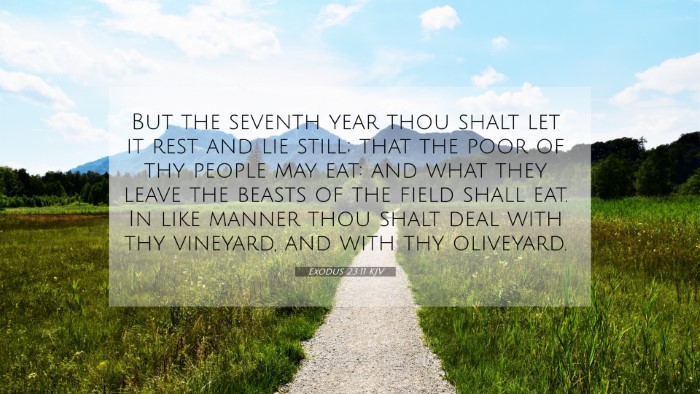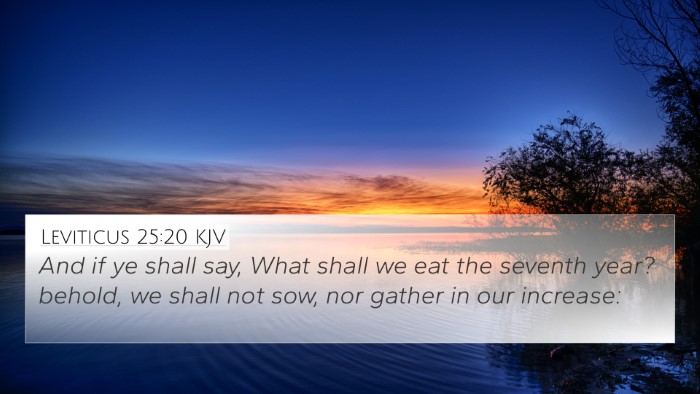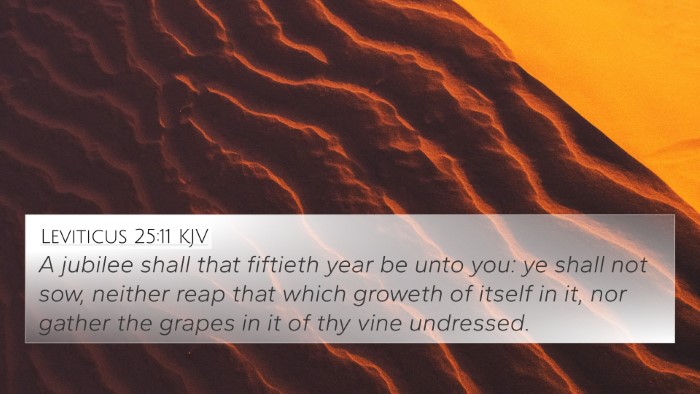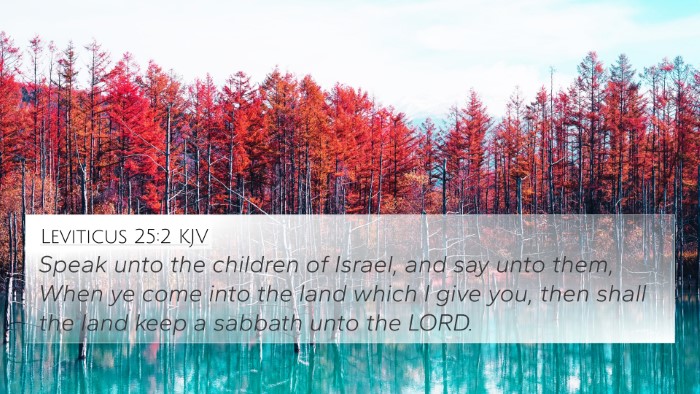Understanding Exodus 23:11
Exodus 23:11 states: "But the seventh year you shall let it rest and lie still, that the poor of your people may eat; and what they leave, the beasts of the field may eat. In like manner you shall deal with your vineyard and your olive grove."
Verse Explanation
This verse is a part of the larger covenant laws given to the Israelites and emphasizes the importance of rest, generosity, and environmental stewardship.
It mandates that during the seventh year, known as the Sabbath year, the land should not be cultivated in order to provide for those in need.
Thematic Insights
- Divine Provision: The Sabbath year anticipates God's provision for both the people and the poor.
- Social Justice: The command illustrates God's concern for the welfare of the marginalized in society.
- Rest for the Land: It also depicts the concept that the land requires rest, reflecting a theological understanding of creation's rhythms.
Commentary Insights
Matthew Henry
Matthew Henry comments on this verse by highlighting God's design for charity and the balance between labor and rest.
He emphasizes that allowing the land to rest is not only an agricultural practice but a moral obligation to ensure that the poor have access to food.
Albert Barnes
Albert Barnes expands on the social implications of this command. He notes that it promotes a communal sense of responsibility, ensuring that the needs of the less fortunate are met during a time when agricultural output is ceased.
Adam Clarke
Adam Clarke remarks on the ecological aspect of this command. He interprets the year's rest as a God-given principle of sustainability, promoting the idea that both the land and people can renew and replenish during a period of inactivity.
Cross-References and Connections
Exodus 23:11 can be connected to several other biblical texts that further elaborate on the themes of social justice, land stewardship, and divine provision.
Here are some relevant cross-references:
- Leviticus 25:3-4: Discusses the principle of the Sabbatical year and the rest it brings to the land.
- Deuteronomy 15:7-11: Commands generosity towards the poor and emphasizes lending without interest.
- Psalms 37:25: Affirms that God provides for the righteous and their descendants.
- Isaiah 58:6-7: Calls for true fasting and helping the oppressed, reflecting God’s desire for social justice.
- Matthew 6:31-33: Jesus teaches reliance on God for provision, echoing the assurance given in Exodus.
- Acts 2:44-45: The early church practiced communal living, ensuring that no one went without, reflecting the spirit of Exodus 23:11.
- James 1:27: Highlights the importance of caring for orphans and widows, which resonates with the call to support the poor.
- Galatians 6:2: Instructs believers to bear one another's burdens, linking to the principle of supporting the needy.
Conclusion
Exodus 23:11 teaches profound lessons about divine provision and our responsibility to others and the environment.
Its linkage with other biblical texts strengthens the theological understanding of social justice and sustainability within God’s creation.
By observing these connections between Bible verses, believers can deepen their scriptural understanding and apply these principles in daily life.
Exploring Further
For those interested in further exploring the interconnectedness of scripture, employing tools such as a bible concordance or a bible cross-reference guide can enhance understanding.
This allows for the identifying connections between the Old and New Testaments and facilitates a comparative Bible verse analysis that enriches one’s spiritual journey.
FAQs about Cross-Referencing Bible Verses
- How to find cross-references in the Bible? Utilize a Bible concordance or search for themes in various passages.
- What verses are related to Exodus 23:11? Refer to cross-references provided in the analysis above.
- How do Exodus 23:11 and Deuteronomy 15 connect? Both emphasize care for the poor and communal responsibility.
- Why is cross-referencing important? It reveals the unity and consistency of biblical themes across different books.







